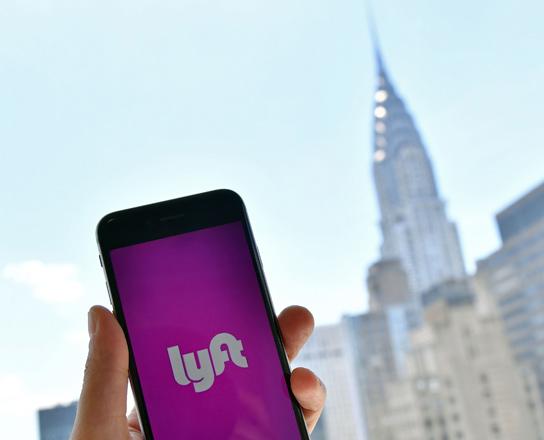You are here
Ride-hail firm Lyft races to leave Uber behind in IPO chase
By Reuters - Dec 06,2018 - Last updated at Dec 06,2018

In this file photo taken on June 29, the Lyft transport application is seen on a smart phone in New York City (AFP photo)
Ride-hailing company Lyft Inc. beat bigger rival Uber Technologies in filing for an initial public offering (IPO) on Thursday, defying the market jitters that threaten to upset a string of technology unicorns from going public next year.
Lyft’s IPO will be a big test of stock market investors’ appetite for companies that rely heavily on part-time workers. Much of its future hinges on its ability to replace drivers who move on after a few weeks or months when they find better paying jobs.
Lyft, last valued at about $15 billion in a private fundraising round, did not specify the number of shares it was selling or the price range in a confidential filing with the US Securities and Exchange Commission (SEC) on Thursday.
Lyft could go public as early as the first quarter of 2019, based on how quickly the SEC reviews its filing, people familiar with the matter said. Lyft’s valuation is likely to end up between $20 billion and $30 billion, one source added.
Lyft would follow a string of high-profile technology unicorn IPOs this year, such as Dropbox Inc. and Spotify Technology SA.
However, market turmoil fuelled by the escalating trade tensions between the United States and China could dampen enthusiasm for the debuts of other 2019 hopefuls like apartment-share service AirBnb Inc., analytics firm Palantir Technologies, Slack Technologies, a provider of chat services for businesses, and Stripe Inc., a digital payment company.
“Market declines mean that the offer price will be lower than otherwise. But there’s a danger of waiting to go public as well. Markets could go even lower, and the companies could raise less money if they waited longer,” said Jay Ritter, an IPO expert and professor at the University of Florida.
A key test for the US IPO market will come later on Thursday with the scheduled pricing of biotechnology start-up Moderna Inc.’s IPO. The company hopes to raise around $500 million.
Flag in the ground
The filing by Lyft, which hired JPMorgan Chase & Co., Credit Suisse and Jefferies as underwriters, plants a flag in the ground to go public before larger rival Uber. The race between them is one of the most closely watched in Silicon Valley. Their bottom lines have taken hits in order to attract drivers and enter new markets, although they have managed in recent years to narrow their losses.
“The ‘cab-hailing-system’ has been antiquated and left as a dinosaur of yesteryears. The good news for ride-sharing is that it’s a market that has shown to be penetrable,” said Jeff Zell, senior research analyst and a partner at IPO Boutique in Florida.
“With autonomous cars on the horizon, it is anyone’s guess where this sector goes in the future. But Uber and Lyft, as name-brand leaders, are leading the race and will have the war chest to be major players for years to come.”
Lyft and Uber have held out the promise of boosting profitability by eventually replacing human drivers with robots piloting autonomous vehicles.
It is not clear how quickly a future of cities and suburbs crisscrossed by fleets of self-driving cars will arrive, given the technical and regulatory challenges, particularly in the United States.
Lyft also will face competition from players such as Alphabet Inc.’s Waymo self-driving unit and General Motors Co.’s Cruise robo-taxi unit.
General Motors holds a 9 per cent stake in Lyft, which it acquired for $500 million in 2016. It has wound down its cooperation with Lyft, choosing to invest more in developing Cruise’s robo-taxi technology and services.
Lyft was set up in 2012 by technology entrepreneurs John Zimmer and Logan Green, three years after Travis Kalanick co-founded Uber.
Related Articles
LOS ANGELES/NEW YORK — Lyft Inc’s.
TOKYO — Japanese car giant Toyota and investment fund SoftBank Vision Fund on Friday unveiled an investment of $1 billion in US company Uber
NEW YORK — Uber Technologies Inc.














